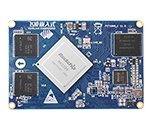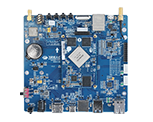【飞凌嵌入式 OK3399-C+开发板试用体验】使用QT工程读取DHT11模块的波折经历
作者:donatello1996
上一帖中已经成功使用一个简单的main函数成功读取到DHT11的温湿度数据了,虽然读取温湿度数据响应时间很慢,但至少算是成功读取了,这次我就想在QT环境下进行温湿度的读取,结合美观的图形界面呈现出来,同时,还可以以文件形式读取ADC_IN4接口 CPU0温度以及CPU1温度,使用到的QT类为QThread,还有Linux系统自带的pthread。为什么说是波折经历呢,因为DHT11这个器件对主控和系统的实时性要求实在是太高了,如果是直接用单片机主控来读取,那就没任何问题,但是要用到微处理器,哪怕是RK3399这种主频那么高的CPU,读取DHT11依然会出现实时性问题,这就很烦,由于QT的图形化界面用到了QMainWindow类,会占用一定的CPU实时资源,在这一两天的探索过程中,我先后用了QThread pthread QTimer三种方式读取DHT11数据,结果表明,要想稳定读取,只能用pthread进行,QThread这种QT内建的多线程实现类完全无法读取,顶多只能读取已经存在/sys中的实时CPU温度数据和ADC接口数据,而QTimer这种定时器中断类就更不用说了,实时性比QThread还低得多,跟pthread的效率比起来就没法比。我不知道QThread的实现代码是怎么写的,按我理解来说应该也只是对pthread做一定的封装,也没想到实时性/效率差这么远。
首先是读写两个CPUzone的温度,需要读取/sys/class/thermal/thermal_zone0/temp和/sys/class/thermal/thermal_zone1/temp:
int fd_cputemp0,fd_cputemp1;
unsigned char buf_cpu_temp0[5];
unsigned char buf_cpu_temp1[5];
fd_cputemp0 = open("/sys/class/thermal/thermal_zone0/temp", O_RDONLY);
fd_cputemp1 = open("/sys/class/thermal/thermal_zone1/temp", O_RDONLY);
read(fd_adc4 , buf_adc4 ,5);
read(fd_cputemp0 , buf_cpu_temp0 ,5);
read(fd_cputemp1 , buf_cpu_temp1 ,5);
而ADC_IN4则是用同样的方法读取/sys/bus/iio/devices/iio:device0/in_voltage4_raw:
int fd_adc4;
unsigned char buf_adc4[5];
fd_adc4 = open("/sys/bus/iio/devices/iio:device0/in_voltage4_raw", O_RDONLY);
read(fd_adc4 , buf_adc4 ,5);
#ifndef MY_THREAD_H
#define MY_THREAD_H
#include <QThread>
#include <stdio.h>
#include <stdlib.h>
#include <unistd.h>
#include <sys/time.h>
#include <sys/types.h>
#include <sys/stat.h>
#include <fcntl.h>
#include "mainwindow.h"
class MainWindow;
class mythread : public QThread
{
public:
mythread(QObject *parent);
void closeThread();
struct timeval tv1;
protected:
virtual void run();
private:
volatile bool isStop;
MainWindow *m_pMainWindow;
int fd_cputemp0,fd_cputemp1,fd_adc4;
};
#endif // DHT11_THREAD_H
#include "mythread.h"
#include "mainwindow.h"
#include <ui_mainwindow.h>
mythread::mythread(QObject *parent)
{
isStop = false;
m_pMainWindow = qobject_cast<MainWindow*>(parent);
}
void mythread::closeThread()
{
isStop = true;
}
extern float dht11_temp,dht11_humi;
void mythread::run()
{
int i=0;
unsigned char buf_adc4[5];
unsigned char buf_cpu_temp0[5];
unsigned char buf_cpu_temp1[5];
while (1)
{
if(isStop)
return;
//gettimeofday(&tv1, NULL);
//qDebug("tv1=%d\n",tv1.tv_usec);
fd_adc4 = open("/sys/bus/iio/devices/iio:device0/in_voltage4_raw", O_RDONLY);
fd_cputemp0 = open("/sys/class/thermal/thermal_zone0/temp", O_RDONLY);
fd_cputemp1 = open("/sys/class/thermal/thermal_zone1/temp", O_RDONLY);
read(fd_adc4 , buf_adc4 ,5);
read(fd_cputemp0 , buf_cpu_temp0 ,5);
read(fd_cputemp1 , buf_cpu_temp1 ,5);
buf_adc4[4]=0;
m_pMainWindow->ui->L1->setText(QString("%1").arg(dht11_temp));
m_pMainWindow->ui->L2->setText(QString("%1").arg(dht11_humi));
m_pMainWindow->ui->L3->setText(QString((char*)buf_adc4));
m_pMainWindow->ui->L4->setText(QString((char*)buf_cpu_temp0));
m_pMainWindow->ui->L5->setText(QString((char*)buf_cpu_temp1));
sleep(1);
}
}
struct dht11_data
{
unsigned short temp;
unsigned short hum;
}curdht11_data;
float dht11_temp,dht11_humi;
pthread_t id;
int fd_dht11;
void *Thread_CPU_Temp(void *arg)
{
int retval;
while(1)
{
retval = read ( fd_dht11 , &curdht11_data , sizeof(curdht11_data) );
if ( retval == -1 )
{
printf ( "read dht11 error" ) ;
}
if(curdht11_data.temp != 0xffff)
{
if(0 < (curdht11_data.temp>>8) && (curdht11_data.temp>>8) < 85)
{
dht11_temp = (curdht11_data.temp >> 8) + (curdht11_data.temp & 0xff) * 0.01;
dht11_humi = (curdht11_data.hum >> 8) + (curdht11_data.hum & 0xff) * 0.01;
printf("---- %f %f-----\n",dht11_temp,dht11_humi);
}
}
//sleep(1);
}
}
int main(int argc, char *argv[])
{
QApplication a(argc, argv);
fd_dht11 = open ( "/dev/dht11" , O_RDONLY) ;
if ( fd_dht11 == -1 )
{
perror ( "open dht11 error\n" ) ;
}
printf ( "open /dev/dht11 successfully\n" ) ;
pthread_create(&id , NULL , Thread_CPU_Temp , NULL);
printf ( "create pthread successfully\n" ) ;
MainWindow w;
w.show();
return a.exec();
}
void MainWindow::on_PB1_clicked()
{
disconnect(ui->PB1,SIGNAL(clicked()),this,SLOT(on_PB1_clicked()));
connect(ui->PB1,SIGNAL(clicked()),this,SLOT(on_PB1_clicked_2()));
ui->PB1->setText("Pause");
thread1->start();
}
void MainWindow::on_PB1_clicked_2()
{
disconnect(ui->PB1,SIGNAL(clicked()),this,SLOT(on_PB1_clicked_2()));
connect(ui->PB1,SIGNAL(clicked()),this,SLOT(on_PB1_clicked()));
ui->PB1->setText("Start");
thread1->closeThread();
thread1->wait();
}
相关产品 >
-
FET3399-C核心板
飞凌RK3399安卓高性能核心板采用 采用六核Rockchip RK3399芯片,双Cortex-A72大核+四Cortex-A53小核结构,对整数、浮点、内存等作了大幅优化,在整体性能、功耗及核心面积三个方面提升。以下将对瑞芯微芯片RK3399参数,RK3399核心板方案及其性能做具体介绍。如您对飞凌RK3399系列核心板有兴趣,欢迎咨询了解。
了解详情
-
OK3399-C开发板
飞凌嵌入式RK3399安卓开发板主芯片采用高性能六核CPU Rockchip RK3399,GPU采用Mail-T860四核 GPU,RK3399作为目RK产品线中低功耗、高性能的代表,可满足人脸识别设备、机器人、无人机、IoT物联网领域应用。飞凌RK3399开发板在整体性能、功耗及核心面积做了大幅度优化,更加满足工业设计需求。飞凌RK3399开发板为进一步减少用户二次开发难度,开放了底板原理图,并提供了RK3399用户手册、芯片手册,加上优质的技术服务,让您的方案从构思到上市时间缩短。
了解详情


